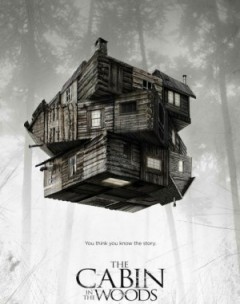
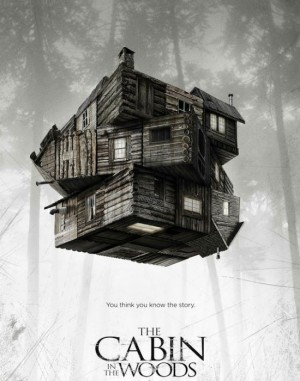
The Cabin in the Woods is a supernatural genre-bender penned by Joss Whedon and Drew Goddard. It is a bizarre story that grows odder as it goes, but there is a focus on character, a decent atmosphere, success in keeping a young and handsome cast from becoming mere plastic eye candy, some intelligent dialogue and a few inspired approaches to scenes. There was enough skill involved in its creation to make a fine work. It had me at the opening; it kept me as events unfolded; it lost me at the end.
To summarize the plot past a certain point is to risk ruining a first viewing. At the beginning, five college students go to a cabin in a woods to spend a weekend drinking, playing games, and committing acts that many religions proscribe outside of matrimony. It is safe to share that the students are being monitored and manipulated, because this aspect is revealed from the outset. From the conversations of the monitors we piece together that the students are going to be put through some sort of gruesome trial, and that these students will, unwittingly, determine the nature of that trial. Beyond that I prefer to say only that beneath this bizarre surface is a whole lot more story to be uncovered.
There are a number of things the movie gets right. Despite the fact that the nature of the cabin is explained early on, there is still a mood of enigma about everything. The monitors become the mystery, rather than the cabin. The dialogue, despite Whedon’s continuing penchant for corny one-liners at the wrong moment, is streamlined, full of character, and delivers just enough information without talking directly to the audience. Tantalizing phrases suggest a deeper plot, hints of which are continuously doled out to us. Even one aspect that seemed initially disappointing, regarding the trite order in which characters must die in a horror movie, is given a surprising yet sufficient explanation later on.
[continue reading…]
Help Promote Prometheus Unbound by Sharing this Post
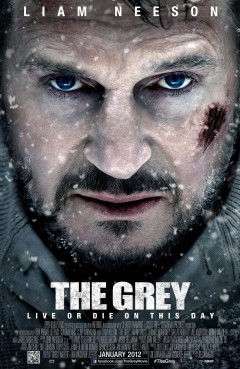
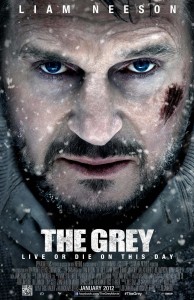 When an airplane bound for Anchorage, having departed from a remote oil refinery, crashes into a frigid Alaskan mountain removed from any sign of civilization, the handful of survivors must band together against the cold and the pack of wolves following them. Such is the scenario in director Joe Carnahan’s The Grey. If you think you have seen it before, you probably have, but probably not like this. The title is fitting both as a description of the bleak snowscape in which the actors find themselves as well as the mood that informs the work, that of an agnostic’s uncertainty and despair.
When an airplane bound for Anchorage, having departed from a remote oil refinery, crashes into a frigid Alaskan mountain removed from any sign of civilization, the handful of survivors must band together against the cold and the pack of wolves following them. Such is the scenario in director Joe Carnahan’s The Grey. If you think you have seen it before, you probably have, but probably not like this. The title is fitting both as a description of the bleak snowscape in which the actors find themselves as well as the mood that informs the work, that of an agnostic’s uncertainty and despair.
I do not expect to see another movie this good until December, unless recent trends are bucked. It is far more than a harrowing survival tale. It is also a very thoughtful piece, something made not by a technician, but by an artist. To be perfectly honest, after seeing Smokin’ Aces and The A-Team, I did not think that Joe Carnahan had it in him. But he has crafted a very effective bit of cinema, something that can appeal to someone looking for some subdued tension and sudden thrills as well as a movie-goer more sensitive to metaphors and in a more introspective mood.
The opening shots of the movie are arresting in their austerity, atmospheric in their composition. It quickly becomes apparent that time will be spent creating a character to care about. Liam Neeson, playing John Ottway, is a man who is burnt out on life, who has, in some undefined way, lost the woman he loves. He puts the business end of a loaded rifle in his mouth, and only the howling of a wolf distracts him from his suicide. He misses the window of opportunity, the moment of resolve. I was intrigued, but it was not until after the plane crash that I was sold.
[continue reading…]
Help Promote Prometheus Unbound by Sharing this Post
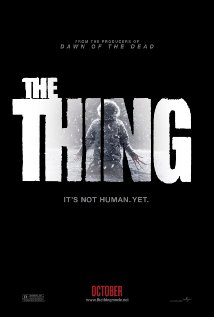
 The Thing, a remake of a remake of a solid sci-fi/horror film directed by, despite what the credits may tell you, Howard Hawks, is being projected onto silver screens in dollar theaters across the country right now. While a viewing of the movie does not immediately make clear why theater space would be made available for such a project, I strongly suspect that in the current climate of more-CGI-less-story-less-character, none of the other reels delivered to theaters contained anything more promising. In other words, for about the same reason I occasionally find myself eating broccoli. The best thing I can say for it is that there were a handful of stretches, some of them two or three minutes in duration, in which I forgot how forgettable the movie was.
The Thing, a remake of a remake of a solid sci-fi/horror film directed by, despite what the credits may tell you, Howard Hawks, is being projected onto silver screens in dollar theaters across the country right now. While a viewing of the movie does not immediately make clear why theater space would be made available for such a project, I strongly suspect that in the current climate of more-CGI-less-story-less-character, none of the other reels delivered to theaters contained anything more promising. In other words, for about the same reason I occasionally find myself eating broccoli. The best thing I can say for it is that there were a handful of stretches, some of them two or three minutes in duration, in which I forgot how forgettable the movie was.
In this third generation version, a young, good-looking scientist is asked to come to Antarctica and given no clear reason why. She is only told that it is important. When she arrives, she discovers the scientists stationed there are excavating an alien spacecraft buried in the ice a hundred thousand years ago. They have found a creature, also buried in the ice, that they believe came along with the ship. It is nothing more than a blurry form under the translucent surface, and next to nothing about it has been discovered.
They dig out a block of ice containing the extraterrestrial but, because this is sci-fi/horror, it escapes and is so unfriendly that people start dying. The rest of the movie is a desperate fight to survive in the most inhospitable environment offered on this planet that still has breathable air. For those keeping track, yes, there is a black man in this movie. No, he doesn’t make it. And that’s not a spoiler, either. As soon as I reported the monster’s escape from its prison you knew no black man was going to live long enough to read the credits.
[continue reading…]
Help Promote Prometheus Unbound by Sharing this Post
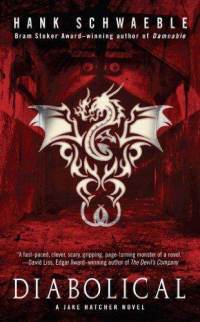
 Diabolical, by Hank Schwaeble, is a Jake Hatcher novel, the sequel to Damnable. It takes place a short time after the events of the first novel, but in a new location. Many of the same characters are back, with a few new ones, and the recipe for the story makes use of the same ingredients in just about the same proportions. How you felt about the first book is, within a reasonable margin, how you are going to feel about its sequel.
Diabolical, by Hank Schwaeble, is a Jake Hatcher novel, the sequel to Damnable. It takes place a short time after the events of the first novel, but in a new location. Many of the same characters are back, with a few new ones, and the recipe for the story makes use of the same ingredients in just about the same proportions. How you felt about the first book is, within a reasonable margin, how you are going to feel about its sequel.
Jake Hatcher has moved out to California to lie low for a while, working as a bouncer at a bar. Despite his precautions, he is found by people who want his services. He winds up entangled in a plot where nothing is as it seems, a demonic apocalypse is at stake, and no one can be trusted. Plot twists abound, as do action and fighting sequences, a little sex is sprinkled in, and the resolution is anyone’s guess right up until the end.
There are some areas in which Diabolical is an improvement on Damnable. Though the first novel had some inspired chapter hooks near the beginning, Diabolical saves its best twists for later on. For this reason, as well as a smoother flow that eliminates a little dead weight found in the first book, the second novel reaches its climax in better fashion than the first. In particular, Schwaeble does a good job of keeping the reader guessing about certain characters. Whereas in the first one there was a general blanket of uncertainty covering nearly everything, in the second the author takes you through highs and lows, at times fabricating a specious certainty that is ripped away, only to be brought back again. If the novel were a marionette, I would say the puppet master has grown more adept at pulling the strings.
[continue reading…]
Help Promote Prometheus Unbound by Sharing this Post

Steven Soderbergh
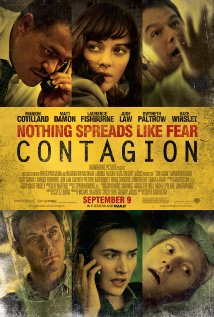 Steven Soderbergh directs a cast full of A-list Hollywood celebrities in the recently released Contagion. Playing into fears that to some extent are natural, while at the same time too often stoked of late by government fearmongers, it tells the story of a new virus that spreads quickly and wreaks havoc on the human race. Some very recognizable faces of the Hollywood elite turn splotchy and froth at the mouth.
Steven Soderbergh directs a cast full of A-list Hollywood celebrities in the recently released Contagion. Playing into fears that to some extent are natural, while at the same time too often stoked of late by government fearmongers, it tells the story of a new virus that spreads quickly and wreaks havoc on the human race. Some very recognizable faces of the Hollywood elite turn splotchy and froth at the mouth.
Comparisons will be made to Wolfgang Petersen’s Outbreak, but beyond the subject matter and big name actors, they do not much resemble one another. Contagion is either a well-researched and realistic movie about the response to a worldwide infectious disease — especially realistic at the level of government agencies like WHO and CDC — a carefully crafted fraud that makes you think it is, or a mix of the two. There are multiple storylines and it feels, at times, like a documentary. Outbreak is more fanciful and less earnest, investing little effort and less concern in realism but a good deal more in story. All things considered, I would say that Outbreak is the superior work, but Contagion is good in every aspect in which — one gets the feeling — it bothered to put in some elbow grease and is worth a viewing at the theater.
Where did it put this elbow grease? In the shots, in the blocking, in the photography, in the acting, in the editing — everywhere but the script. As one would expect from a Soderbergh film, it is well shot. Everything around the story works at a higher level than what you usually find in theaters nowadays. It has a good solid skeleton, healthy skin, strong muscles, even a brain, but it lacks a heart.
Perhaps it is a bit unfair to say that no elbow grease was spent on the script. I do not mean to give the impression that the screenwriter was incompetent. It was, as I said, either a well-researched flick or a good facsimile, either of which takes some work and skill. However, the type of story it tells, and the time it has to tell it, limit how emotionally invested we can become in the characters, which in turn limits how engrossed we can be in the action, the obstacles, and the resolution.
[continue reading…]
Help Promote Prometheus Unbound by Sharing this Post
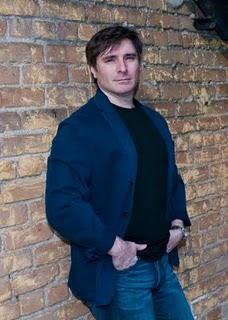
Hank Schwaeble
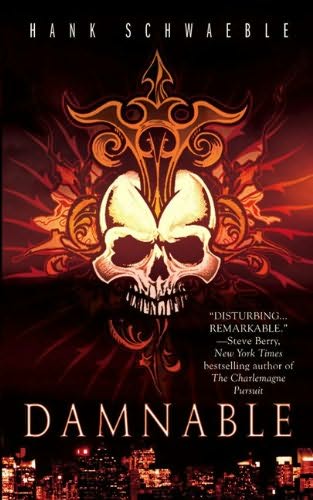 Damnable, by Hank Schwaeble, has been called noir, but anyone who has seen The Third Man, Double Indemnity and The Asphalt Jungle will see no more than a tenuous connection to what noir originally was. Just like the word libertarian often gets applied to anyone who is pro-choice on two or more issues, noir gets thrown at any tale with a dark atmosphere, a detective and/or so much as a single morally ambiguous character, resulting in an abundance of wrongly labeled people and stories. Damnable, winner of the 2009 Bram Stoker Award, is not noir any more than Bill Maher is a libertarian; it is a mix of detective tale, supernatural story full of demons and cultish rituals, and MMA-style fighting and action.
Damnable, by Hank Schwaeble, has been called noir, but anyone who has seen The Third Man, Double Indemnity and The Asphalt Jungle will see no more than a tenuous connection to what noir originally was. Just like the word libertarian often gets applied to anyone who is pro-choice on two or more issues, noir gets thrown at any tale with a dark atmosphere, a detective and/or so much as a single morally ambiguous character, resulting in an abundance of wrongly labeled people and stories. Damnable, winner of the 2009 Bram Stoker Award, is not noir any more than Bill Maher is a libertarian; it is a mix of detective tale, supernatural story full of demons and cultish rituals, and MMA-style fighting and action.
This is not to denigrate the work — or Bill Maher — but merely to put it in its proper category. As a story it is a modest success, not profound perhaps, but also without pretensions of depth and nuance. On the first page, a character muses, “Coffee was like pizza and sex — no matter how bad it was, it was usually still pretty good.” In other words, the author is decent enough to tell us straight away we will not be wrestling with complex ideas and weighty issues. When a zombie attacks a few paragraphs later, it is the author letting us know what we will be doing.
I enjoyed my time with the novel, which I believe is all the author ever wanted for his readers. I know I enjoyed it because I put my book mark in the sequel as soon as the last page was turned. The main character, Jake Hatcher, is something more than one dimensional, interesting from the outset. His situation is intriguing, his history morally ambiguous, and his abilities perfect for the action to follow.
We first meet Jake as a convict in a military prison. One of his jailors has it out for him, and Jake suspects his cellmate has been recruited to pick a fight with him, to get him in trouble so his term can be lengthened. There is also another trap his jailor has set for him, and while he tries to navigate these he gets a call from his mother telling him his brother has died, an event we saw in the prologue.
[continue reading…]
Help Promote Prometheus Unbound by Sharing this Post
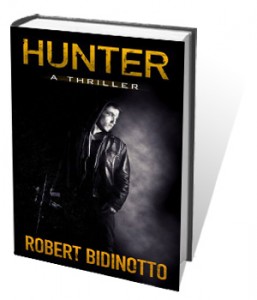
In a recent addition to the Libertarian Tradition podcast series, part of the Mises Institute’s online media library, Jeff Riggenbach uses Objectivist Robert Bidinotto’s novel Hunter as a launchpad to discuss Objectivist subculture and fear.
You can also read the transcript below:
In a recent conversation with a younger libertarian, I heard something that I found somewhat surprising and somewhat disturbing at the same time. But later, on reflection, I realized that what I had heard should not have surprised me, however much it may still disturb me. My young friend had said, and I paraphrase here, that he was surprised to learn that I thought of Objectivists as libertarians at all. Based on what he had seen of the positions they took on political issues, especially foreign policy, he had concluded that they were just another kind of neocon.
I refer to this younger libertarian as “my young friend,” but the fact is, he’s no kid; he’s in his early 40s, which tells you how long the situation with respect to Objectivism that I’m going to describe and deplore has been going on — that a man in his 40s cannot remember a time when leading Objectivists didn’t talk in such a way about questions of US foreign policy (and about other questions as well, as we shall see) that they become hard to differentiate from certain kinds of conservatives and hard to see as any sort of libertarian.
But before I get further into that depressing theme, there’s a new book I’d like to commend to your attention. It’s a novel entitled Hunter: A Thriller, and it’s the work of the prominent Objectivist writer Robert Bidinotto. Now, a word of caution. What follows is not properly a book review, because what I’m really interested in talking about here is not Bidinotto’s thriller in its capacity as a novel, an entertainment, a work of “popular art,” but rather what it can tell us in its capacity as a cultural artifact.
[continue reading…]
Help Promote Prometheus Unbound by Sharing this Post








 Steven Soderbergh
Steven Soderbergh









